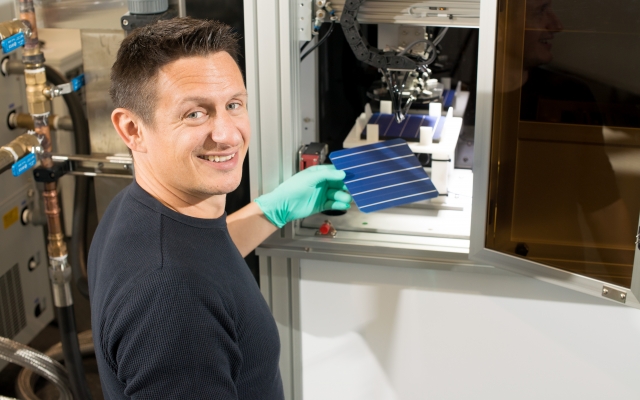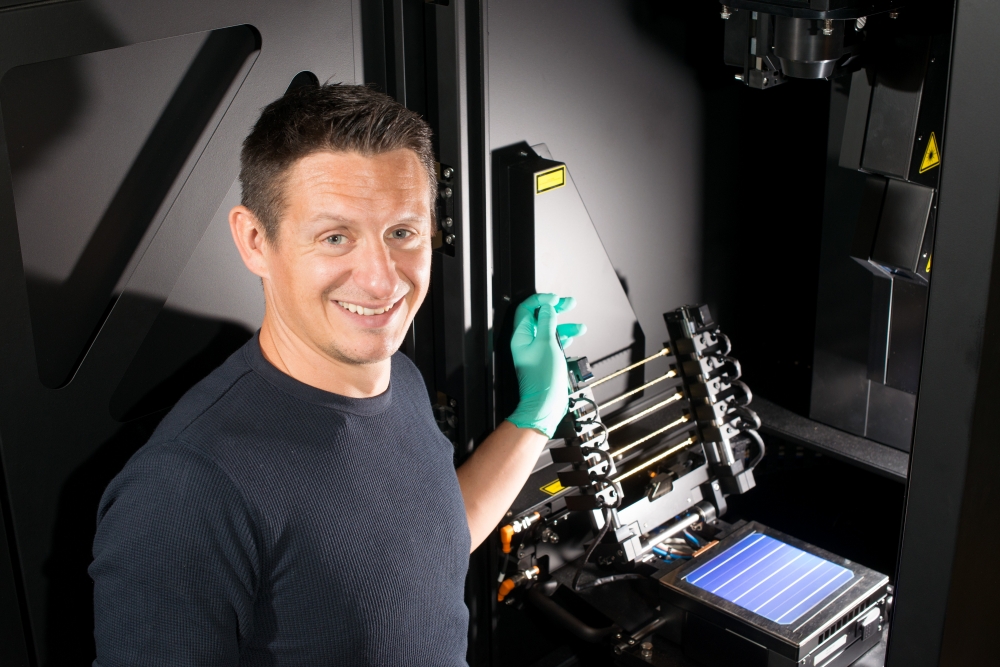
Dr Brett Hallam has been nominated for the 3M Eureka Prize for Emerging Leader in Science.

UNSW School of Renewable Energy Engineering (SPREE) researcher Brett Hallam is up for a Eureka Prize in the Emerging Leader in Science section, making it the third time this year he has been recognised for his research into solar cell technology.
Earlier this month Dr Hallam flew to San Francisco to pick up Renewable Energy World’s 40 Under 40 award for young achievers in solar (with colleagues Associate Professor Bram Hoex and Dr Alison Ciesla), and was also named in Create magazine’s list of Australia’s Most Innovative Engineers for 2018.
Dr Hallam is currently an Australian Research Council Discovery and Early Career Research Award (DECRA) Fellow, having received the JG Russell Prize from the Australian Academy of Science. He is also the Research Director for Advanced Hydrogenation in the School of Photovoltaic and Renewable Energy Engineering at UNSW.
Dr Hallam is recognised internationally for his work on crystalline silicon PV, and is regarded as the leading expert globally for hydrogen passivation in silicon solar cells; an area that has been considered as ‘black magic’ for decades.
Dr Hallam worked under the late Professor Stuart Wenham to formalise the advanced hydrogenation techniques which are now being used commercially by solar cell manufacturers.
“I was nominated for commercialisation of that technology of advanced hydrogenation as well as the light induced degradation (LID) mitigation,” Dr Hallam says.
So how does he feel now being a contender for a Eureka?
“I’m pretty happy, it’s been a great month for me with all these coming at once.
“It would be a very nice one to win, it would mean I can buy a couple of surfboards and kiteboards,” Dr Hallam laughs. “And of course it’s a great prestigious prize!”
UNSW Engineering Dean, Professor Mark Hoffman says Dr Hallam’s achievements this year are a great reflection of the world leading work being undertaken by the SPREE researchers.
“Brett is having quite a year,” Professor Hoffman says.
“His nomination for the 3M Eureka Prize for Emerging Leader in Science is an acknowledgement of how much his work in hydrogenation and light induced degradation has advanced solar cell technology.”
Other nominees for Eureka awards from UNSW are:
• Scientia Professor Justin Gooding, Dr Parisa Khiabani and Dr Alexander Soeriyadi, School of Chemistry - ANSTO Eureka Prize for Innovative Use of Technology
With one in three Australians are diagnosed with skin cancer by age 70, knowing when you’ve had too much sun is crucial. Professor Gooding, Dr Khiabani and Dr Soeriyadi have created a simple and affordable paper-based sensor that indicates to the wearer when to seek shade or apply more sunscreen.
• Professor Andrew Pitman, Director, ARC Centre of Excellence for Climate Extremes -CSIRO Eureka Prize for Leadership in Innovation and Science
Professor Pitman has transformed how Australian climate science thinks and works – moving from competitive silos to a collaborative community focused on national and global outcomes. By bringing together and maintaining a consortium of leading universities and institutions, he has transformed the scale and impact of Australian climate science research. Professor Pitman leads the ARC Centre of Excellence for Climate Extremes (CLEX), based at UNSW.
• Dr Jakub Stoklosa, School of Mathematics and Statistics, UNSW Science. In collaboration with researchers from the University of Melbourne; La Trobe University and Mount Buller Mount Stirling Resort Management - NSW Office of Environment and Heritage Eureka Prize for Environmental Research
The unique Mountain Pygmy Possum population of Mt Buller had been isolated for 20,000 years but was facing imminent extinction just ten years after it was discovered. Through a program of cross breeding isolated populations of the threatened species, the Burramys Genetic Rescue Team was able to boost genetic variation, translating to population growth, healthy breeding and improved survival rates. Australia’s first genetic rescue has become a template for saving other species under threat.
Dr Stoklosa’s role as a statistician was to provide reliable and accurate estimates of mountain pygmy possums abundances using statistical methods and recapture data collected over 20 years.
• Professor Sally Dunwoodie, Victor Chang Cardiac Research Institute - UNSW Eureka Prize for Scientific Research
Professor Sally Dunwoodie and her multidisciplinary team have discovered the potential of vitamin B3 to treat a molecular deficiency causing miscarriages and multiple types of birth defects. Their finding could prevent developmental defects through a common dietary supplement, which may transform the way pregnant women are cared for around the world.
• Professor Michelle Haber AM, Children's Cancer Institute and UNSW - CSIRO Eureka Prize for Leadership in Innovation and Science
Professor Haber is a global authority in childhood cancer research, setting the agenda for the field in Australia. She is the driving force behind Zero Childhood Cancer, a world-leading initiative that unites researchers and clinicians from every child cancer research and clinical care facility nationwide.
• Professor Guy Marks, working with a multi-institutional team of four from UNSW, University of Sydney and the Woolcock Institute for Medical Research, including Dr Jennifer Ho, a former UNSW PhD student - Australian Infectious Diseases Research Centre Eureka Prize for Infectious Diseases Research
Tuberculosis is the leading infectious disease killer in the world, yet one third of cases are not diagnosed. Using innovative screening techniques in robustly-designed clinical trials, the Act Now for Tuberculosis Control Team has made major breakthroughs that promise to transform global efforts to eliminate the disease. In their study, the team found pro-actively screening people who share households with other TB patients has more than doubled the detection rate of TB and reduced the mortality rate by 40%.
• Associate Professor Darren Saunders, School of Medical Sciences, UNSW Medicine -Celestino Eureka Prize for Promoting Understanding of Science
A gifted and intuitive communicator, Associate Professor Darren Saunders gives medical research a clear, authoritative voice across a diverse range of media. He makes evidence-based science accessible to the general public, with particular emphasis on platforms through which vulnerable audiences are seeking health advice. Associate Professor Saunders’ particular areas of research are cancer, cell biology, gene regulation and biochemistry.
